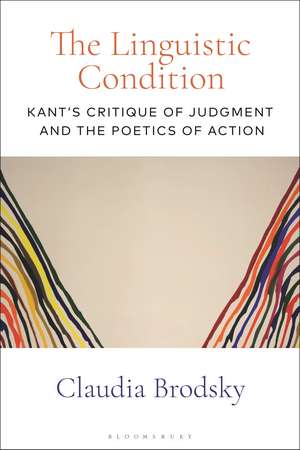The Linguistic Condition: Kant's Critique of Judgment and the Poetics of Action
Autor Professor Claudia Brodskyen Limba Engleză Paperback – 28 dec 2022
| Toate formatele și edițiile | Preț | Express |
|---|---|---|
| Paperback (1) | 192.30 lei 6-8 săpt. | +72.40 lei 4-10 zile |
| Bloomsbury Publishing – 28 dec 2022 | 192.30 lei 6-8 săpt. | +72.40 lei 4-10 zile |
| Hardback (1) | 569.76 lei 6-8 săpt. | +121.53 lei 4-10 zile |
| Bloomsbury Publishing – 19 mai 2021 | 569.76 lei 6-8 săpt. | +121.53 lei 4-10 zile |
Preț: 192.30 lei
Preț vechi: 249.87 lei
-23% Nou
Puncte Express: 288
Preț estimativ în valută:
36.79€ • 38.42$ • 30.39£
36.79€ • 38.42$ • 30.39£
Carte tipărită la comandă
Livrare economică 15-29 aprilie
Livrare express 08-14 martie pentru 82.39 lei
Preluare comenzi: 021 569.72.76
Specificații
ISBN-13: 9781350217355
ISBN-10: 1350217352
Pagini: 272
Dimensiuni: 156 x 234 x 25 mm
Greutate: 0.39 kg
Editura: Bloomsbury Publishing
Colecția Bloomsbury Academic
Locul publicării:London, United Kingdom
ISBN-10: 1350217352
Pagini: 272
Dimensiuni: 156 x 234 x 25 mm
Greutate: 0.39 kg
Editura: Bloomsbury Publishing
Colecția Bloomsbury Academic
Locul publicării:London, United Kingdom
Caracteristici
First linguistic analysis of Kant's Critique of Judgement.
Notă biografică
Claudia Brodsky is Professor of Comparative Literature at Princeton University, USA.
Cuprins
Preface. Acting upon Condition Chapter One. Introduction: Before Judgment: Doing without Knowing in Kant and Diderot Part I. Linguistic Conditions Chap. Two. "The Condition of Judgment:" Kant's "Common Sense," or the Origin of Language in the Third Critique 1. "'Common Sense'" and Signification, or What is Not Tautology 2. "Technique" 3. "Free" 4. "Feeling" 5. Speech Act and "Communicability" 6. Rousseau's Nouns 7. Diderot's Adjectives 8. Kant's Predicates: "Synthetic Judgments a Priori" and "A General Voice" 9. "The Schema," or Language Inside 10. What is Articulation? 11. World Without Words: Wordsworth Part II. Missing Senses and Poetics Chap. Three. "Judgment" and the Genesis of What We Lack: "Poetry," "Schema,"and the "Monogram of Imagination" in Kant 1. "Judgment" in the "Age of Critique" 2. Judgment and "Indifference:" The "Common Sense" of Imagination in Arendt and Kant 3. The Schema and the Language of Poetry 4. Poetry and the Judgment of Critique Chap. Four. Kleist's Mere Formalities 1. Kant and Kleist: Representation and Irony 2. What happened: Missed Representation and Misrepresentationin "Die Marquise von O." 3. Contesting "Judgment" in "The Duel" BibliographyPrimary Bibliography Secondary Bibliography
Recenzii
This is a nigh-monumental, clearly arranged and clearly argued book on the most basic terminological elements of Kant's Critique of Judgment-which turn out (not surprisingly) to be key to the whole critical enterprise. Brodsky weaves her treatments of those Kantian elements with analyses of their repercussions on the philosophical and literary legacy of a range of thinkers.
Challenging the canon of received notions about Kant and his project of critique, Brodsky's brilliant newest book recovers the critical moment in Kant's theory of judgment as the third and decisive critical force that underpins Kant's critical project: the linguistic condition. Along the way, the book offers stunning explorations of Rousseau and Diderot as fellow travelers on the critical trajectory they share. Provocative, dazzling, and revelatory, Brodsky liberates Kant from a reception that has alternatively reduced his Critique of Judgment to an aesthetics or a philosophy of nature, illuminating the central linchpin Kant here explores: the power to speak "in a general voice" he so enigmatically calls Gemeinsinn, which allows us to judge but resists the conceptual grasp that any epistemology presupposes. Anything but "Common Sense" of the various longstanding varieties that attempt to conflate commonplace notions with the "grounds" on which we think and speak, Kant opens here a new line of investigation we are yet to fully appreciate. The final chapter offers compelling readings of the elusiveness of judgment in Kleist that demonstrate the poet's profound affinity with exactly this Kantian concern, and the philosopher's critical affinity with literature.
Challenging the canon of received notions about Kant and his project of critique, Brodsky's brilliant newest book recovers the critical moment in Kant's theory of judgment as the third and decisive critical force that underpins Kant's critical project: the linguistic condition. Along the way, the book offers stunning explorations of Rousseau and Diderot as fellow travelers on the critical trajectory they share. Provocative, dazzling, and revelatory, Brodsky liberates Kant from a reception that has alternatively reduced his Critique of Judgment to an aesthetics or a philosophy of nature, illuminating the central linchpin Kant here explores: the power to speak "in a general voice" he so enigmatically calls Gemeinsinn, which allows us to judge but resists the conceptual grasp that any epistemology presupposes. Anything but "Common Sense" of the various longstanding varieties that attempt to conflate commonplace notions with the "grounds" on which we think and speak, Kant opens here a new line of investigation we are yet to fully appreciate. The final chapter offers compelling readings of the elusiveness of judgment in Kleist that demonstrate the poet's profound affinity with exactly this Kantian concern, and the philosopher's critical affinity with literature.
